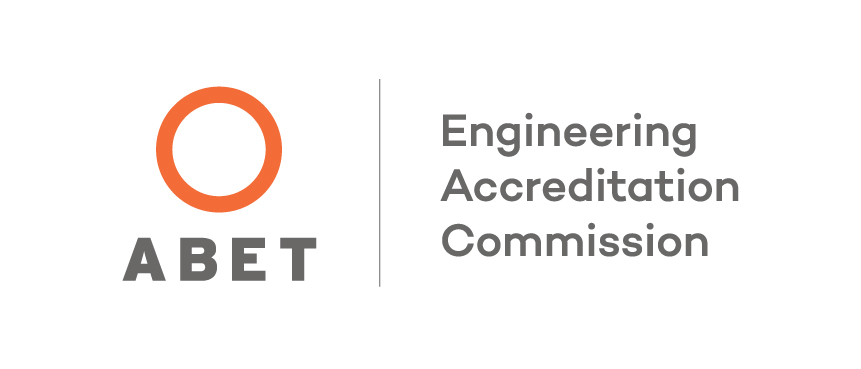Accreditation

The ABET accreditation process, a voluntary, non-governmental process of peer review, helps assure quality in educational programs. ABET-accredited educational programs must meet certain defined standards. The chemical and biochemical engineering program is accredited by the Engineering Accreditation Commission of ABET.
The Chemical Engineering (B.S.) degree program is accredited by the Engineering Accreditation Commission of ABET, https://www.abet.org, under the General Criteria and Program Criteria for Chemical, Biochemical, Biomolecular and Similarly Named Engineering Programs. The ABET accreditation process, a voluntary, non-governmental process of peer review, helps assure quality in educational programs. ABET-accredited educational programs must meet certain defined standards.
The Biomedical Engineering (B.S.) degree program will have 1st graduates at Spring 2028 and we'll seek accreditation that fall.
Department Vision
A leading program recognized for sustained excellence in education, research, and innovation with strong global engagement in chemical engineering.
Department Mission Statement
The Doshi Department of Chemical and Biochemical Engineering will prepare chemical, biochemical, biomedical, and bio engineers for successful careers as leaders and innovators in their field while:
- Expand the engineering knowledge base through experiential learning and scholarly pursuits
- Developing technology to serve societal needs
- And benefiting the public welfare through service to the profession.
Program Educational Objectives
Within five years of graduation, our students will become successful in their chosen career path by:
- Making a positive impact as an individual contributor or leader in their industry, business, and community;
- Working collaboratively to improve the economic and societal environment of their industry sector and community; and
- Expanding career skills through life-long learning.
Student Learning Outcomes for Each Educational Program
B.S. in Chemical Engineering and in Biomedical Engineering
Upon graduation, our students will exhibit the following:
- An ability to identify, formulate, and solve complex engineering problems by applying principles of engineering, science, and mathematics
- An ability to apply engineering design to produce solutions that meet specified needs with consideration of public health, safety, and welfare, as well as global, cultural, social, environmental, and economic factors.
- An ability to communicate effectively with a range of audiences.
- An ability to recognize ethical and professional responsibilities in engineering situations and make informed judgments, which must consider the impact of engineering solutions on global, economic, environmental, and societal contexts.
- An ability to function effectively on a team whose members together provide leadership, create a collaborative and inclusive environment, establish goals, plan tasks, and meet objectives.
- An ability to develop and conduct appropriate experimentation, analyze and interpret data, and use engineering judgment to draw conclusions.
- An ability to acquire and apply new knowledge as needed, using appropriate learning strategies.
Undergraduate Enrollment:
- 2020-21: 300
- 2021-22: 294
- 2022-23: 249
- 2023-24: 294
Bachelor Degrees Awarded:
- 2020-21: 105
- 2021-22: 89
- 2022-23: 89
- 2023-24: 80
Graduate Certificate in Process Engineering
By the time students complete this certificate, they will possess within their field of study:
- An ability to apply knowledge of chemical engineering processes to their specific field of study
- An ability to communicate effectively with a range of audiences.
Graduate Certificate in Carbon Management Engineering
By the time students complete this certificate, they will possess within their field of study:
- An ability to apply knowledge of current cardon management technologies to their specific field of study
- An ability to communicate effectively with a range of audiences.
M.S. (Thesis and Nonthesis) in Chemical Engineering
Upon graduation our students will exhibit the following:
- An ability to apply knowledge of chemical engineering and engage in critical thinking to identify, formulate, and solve problems
- An ability to communicate effectively with a range of audiences
- An ability to develop professionally by acquiring and applying new knowledge as needed, using appropriate learning strategies.
Ph.D. in Chemical Engineering
Upon graduation our students will exhibit the following:
- An ability to apply knowledge of chemical engineering and engage in critical thinking to identify, formulate, and solve problems
- An ability to communicate effectively with a range of audiences
- An ability to engage in productive critical thinking so that they may attain a mastery of their specific field of study
- An ability to develop professionally by acquiring and applying new knowledge as needed, using appropriate learning strategies.
Ph.D. in Bioengineering
Upon graduation our students will exhibit the following:
- An ability to apply knowledge of bioengineering and engage in critical thinking to identify, formulate, and solve problems
- An ability to communicate effectively with a range of audience
- An ability to engage in productive critical thinking so that they may attain a mastery of their specific field of study
- An ability to develop professionally by acquiring and applying new knowledge as needed, using appropriate learning strategies.
Graduate Enrollment:
- 2020-21: 43
- 2021-22: 41
- 2022-23: 36
- 2023-24: 40
M.S. Degrees Awarded:
- 2020-21: 9
- 2021-22: 6
- 2022-23: 4
- 2023-24: 4
Ph.D. Degrees Awarded:
- 2020-21: 13
- 2021-22: 8
- 2022-23: 8
- 2023-24: 3

Follow Linda and Bipin Doshi Department of Chemical and Biochemical Engineering